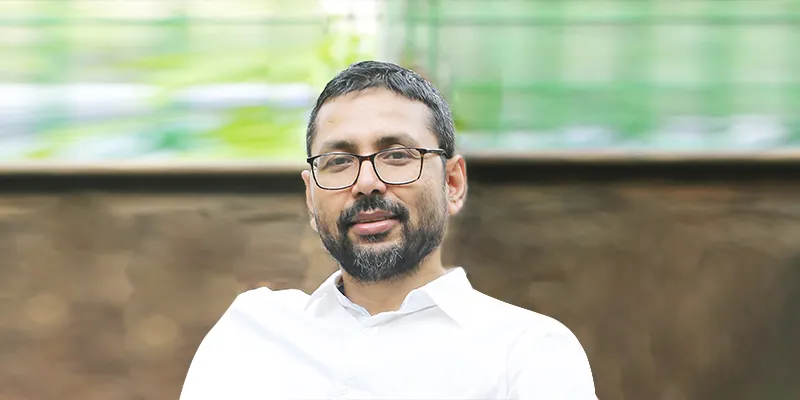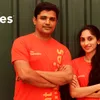Why this former Ola marketing head is betting on organic baby food with his Mumbai-based startup
When he became a father, Pankaj Prakash realised how difficult mealtime was for babies and parents. He soon launched Happa Foods, which offers organic, healthy, and tasty baby food in tubs and pouches.
Crying jags, colic, sleep issues, milestones, breastfeeding…new parents face all these and more stresses every day. And then the day comes when the baby can eat solid foods. New problems and questions crop up.
“Is the food too granular?”
“Do vegetables retain nutrition after boiling?”
“Do I need to cook apples before pureeing?"
Travelling with a child adds to the stress – every meal seems like a battle for the parents.
This truth hit home when Pankaj Prakash, 37, and his wife became parents. But the seeds of the startup were sown earlier.
“Sometime in 2016, I was accompanying my sister and her six-month-year old baby from Delhi to Mumbai,” Pankaj recalls. “That 14-hour train journey turned out to be the longest - and most worrisome - ride I have ever taken,” he adds.

Pankaj Prakash, Founder of Happa Foods
New kid on the block
When Pankaj, who was then heading marketing at Ola and was responsible for its launch in Delhi and Bengaluru, and his wife had a daughter a year later, they went through the same problem: finding nutritious and clean food to feed the baby, especially while travelling.
“It led to the idea that there had to be a healthy and hassle-free option for parents to feed their kids on the go,” Pankaj says.
After research that spanned a year and a half, Pankaj founded Mumbai-based Happa Foods in February 2017. The Mumbai-based startup sells organic, healthy, and tasty baby food in tubs and pouches.
“We are on a mission to inspire a lifetime of healthy eating habits from the very first bite,” Pankaj says.
An alumnus of MICA, Pankaj has 12 years of experience across products and categories. Before starting Happa, he was with Ola, and has previously worked with ICICI Prudential and UNIDO. He also co-founded green tea brand LaPlant.
He used his personal savings to make an initial investment of Rs 20 lakh and began working on Happa Foods with a team of professionals, packaging manufacturers, and a food scientist. Happa Foods is currently a team of 17 people. They also have an advisory panel of parents on board, who offer feedback every time a new product is launched.
Clean and green food for babies
Happa Foods at present offers fruit, vegetable, and grain-based blends that come in tubs or pouches.
The purees are divided into three categories – single fruit purees, combination purees, and a blend of fruits and grains. They cater to different stages of a child’s growth.
The shelf life of these products is six to nine months.
“Happa Foods can be stored at room temperature,” Pankaj says.
Priced between Rs 99 and Rs 249, Happa Foods is available on ecommerce platforms like Amazon (Happa was a part of Amazon’s LaunchPad Programme), Firstcry, Babychakra, Flipkart, Snapdeal, 1mg, and Bigbasket.
“We have also partnered with the Future Group and are now available at Foodhall and Hypercity stores,” Pankaj says.
Happa is also working with Reliance Retail.

Happa's Purees
The challenges they faced
Happa Foods faced several challenges since the team was “wading in uncharted waters”, Pankaj says.
Happa had no ground rules to follow and knowledge to tap into. Moreover, lab testing and trials were expensive.
“A single machine run for a small batch of trial products would cost over Rs 25,000,” the founder says.
Given the nature of Happa’s target audience, the team wanted to be doubly sure of the quality of the product and started from scratch.
From farm to factory
Happa sources ingredients directly from farms. It sources apples and peaches from Himachal Pradesh and Uttarakhand while spinach is sourced from an organic farm in Nasik.
“Depending on the perishability, raw materials are sourced in a particular window,” Pankaj says.
Once the materials are sourced, they are sent for production to a factory that Happa has partnered with. The factory is certified by the US Food and Drug Administration and British Retail Council.
“We also have Hazard and Critical Control Point (HACCP) Certification, which ensures that every critical point is regularly monitored and controlled,” Pankaj says.
Once processed, each unit is kept in incubation and quality checks are conducted. “The processed material is shipped out of the company’s warehouse once we get the go-ahead,” Pankaj adds.
As of now, Happa claims to cater to 15,000 children per month and says it has recorded 11x growth in revenue, last year.

Team Happa Foods
Market overview
According to Statista, revenue in the baby food segment in India amounts to $5,642 million in 2019 and is expected to grow annually by 9.1 percent.
Happa Foods competes with the likes of Nutreat Life, BabyStaples, Bebe Burp, and Happibo. However, what sets Happa's purees apart is that they are free of pesticides and other toxins. The purees do not contain additives, chemicals, salt, and sugar. Moreover, they are ethically sourced non-GMO products and do not generate any kind of industrial waste.
“We have made our packaging on-the-go friendly. So be it at a daycare, in a plane, or at a wedding venue, parents don’t have to compromise on their child’s nutrition,” Pankaj says.
The startup, apart from winning over many parents, is also finding recognition. Happa Foods won the ‘Best Retail Startup’ Award by Retailer Association of India. The Trade Promotion Council of India has decided to showcase the baby food company as an ‘Emerging Brand from India’ at Indus Food, 2019, a food export promotion event in Noida.
Pankaj says he’s on a mission to re-imagine baby food in India and partner parents in “their fight against the onslaught of junk food from MNCs”. He’s also looking to raise funds soon.
What’s in the future for Happa Foods? The team plans to launch more product categories catering to different age groups.
“We want to launch everything – from meals and snacks to lunch box options and munchies,” Pankaj says.





![[Startup Bharat] Meet IIT aspirants turned college dropouts who are now running a foodtech star...](https://images.yourstory.com/cs/2/3fb20ae0-2dc9-11e9-af58-c17e6cc3d915/eatXD1554803294821.jpg?fm=png&auto=format&h=100&w=100&crop=entropy&fit=crop)
![[Startup Bharat] Odisha-based Swargadwara steps in during a difficult time by offering funeral ...](https://images.yourstory.com/cs/2/a9efa9c0-2dd9-11e9-adc5-2d913c55075e/swargadwara1558600528808.png?fm=png&auto=format&h=100&w=100&crop=entropy&fit=crop)




